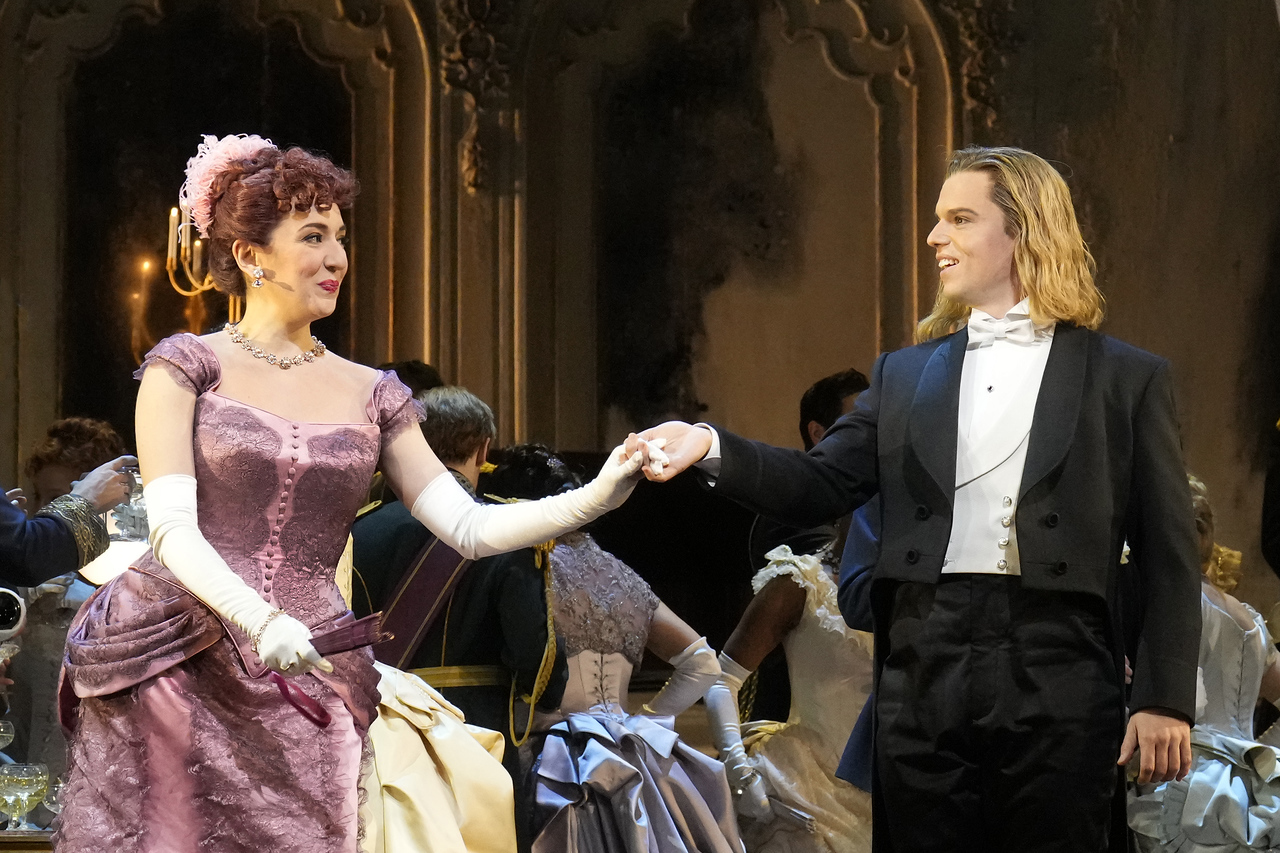
Press Releases
-
Reviews
Fedora at the Met: A Pretty Relic, Well-Exhumed
January 4, 2023 | By Fred Cohn, Musical America
 The timing was a bit unfortunate. Just days before the opening night of the Metropolitan Opera’s new production of Fedora, the company announced in The New York Times that it was planning to intensify its focus on contemporary works. “Opera should reflect the times we’re in,” Music Director Yannick Nézet-Séguin told the Times—words that could almost be interpreted as a dig at Fedora itself. For the 1898 verismo opera is clearly a relic, its tale of late-Tsarist-period passion and betrayal depending on the hoariest conventions of 19th-century melodrama. Moreover, nobody is likely to argue that Umberto Giordano’s score is top-grade material: It is definitely a thing of tinsel and, one hit tune aside, little of it is memorable.
The timing was a bit unfortunate. Just days before the opening night of the Metropolitan Opera’s new production of Fedora, the company announced in The New York Times that it was planning to intensify its focus on contemporary works. “Opera should reflect the times we’re in,” Music Director Yannick Nézet-Séguin told the Times—words that could almost be interpreted as a dig at Fedora itself. For the 1898 verismo opera is clearly a relic, its tale of late-Tsarist-period passion and betrayal depending on the hoariest conventions of 19th-century melodrama. Moreover, nobody is likely to argue that Umberto Giordano’s score is top-grade material: It is definitely a thing of tinsel and, one hit tune aside, little of it is memorable.But David McVicar’s staging demonstrated that this thoroughly old-fashioned opera can still generate plenty of old-fashioned excitement. It moved like a house afire: a listener sat taking in each implausible turn of the plot, eagerly awaiting the next. The polychromatic production, with sets by Charles Edwards and costumes by Brigitte Reiffenstuel, was more pleasing to the eye than McVicar’s bleak recent Met Medea and Don Carlos.
The director introduced one outright perversity: In the opera as written, Fedora’s fiancé Vladimiro never sets foot on stage, dying unseen in the middle of Act I. But here his ghost keeps showing up, for no discernible reason, in subsequent acts. It is as if McVicar doesn’t trust us to understand the character’s role without parading him before us. For the most part, though, McVicar moves the action forward without undue intervention.
The Victorien Sardou play that served as Fedora’s source material was a vehicle for Sarah Bernhardt; the opera, too, is a diva showcase. Here the assignment fell to Sonya Yoncheva. She cut a glamorous figure on stage. She brought plenty of color to her singing, especially in her lovely, complex middle range and her decisive, if discreetly employed, chest voice. Her upper range was no less patchy than it has been for several seasons, but in this corner of the repertory, vivid declamation outranks purity of vocal production.
Yoncheva sometimes gave the sense of offering a diligent approximation of the verismo grand manner rather than the thing itself. In the first act especially, the great-lady air that she affected got in the way of emotional transparency: you couldn’t quite discern, behind this Fedora’s stately exterior, her human distress over her lover’s mortal wound. But you could appreciate throughout the Bulgarian soprano’s focused, conscientious effort to give herself over to the role.
 Rosa Feola as Countess Olga, Bryan Waghorn as her protégé Boleslao Lazinski
Rosa Feola as Countess Olga, Bryan Waghorn as her protégé Boleslao LazinskiPiotr Beczala had an unequivocal success in the leading-man role of Loris. His voice has in recent years expanded to verismo proportions while still maintaining the gleam of its lyric-tenor roots. In “Amor ti vieta,” Fedora’s hit tune, the thrills came not just because of Beczala’s generous outpouring of sound, but through his ability to use the “ping” in his voice to move the line forward, turning the short aria into a grand romantic gesture. Loris is not a long role, but that made Beczala’s time at center stage all the more precious; in his singing, brilliant lyrical statements followed each other, one to the next. He brought tremendous pathos to the opera’s denouement, where Loris learns that his beloved mother and brother have died, then watches his lover Fedora, who has poisoned herself, slip into oblivion. The creaky melodramatics of the plot mechanisms hardly mattered here: Beczala let us feel the character’s human suffering.
Soprano Rosa Feola, who has previously appeared at the Met only as the maidenly Gilda in Rigoletto, here took on the very different role of the flibbertigibbet Countess Olga. A red wig rendered her nearly unrecognizable. But her singing displayed her usual intelligence, her treatment of her native language was once again a pleasure to encounter, and in the role’s flighty coloratura, she offered a reminder of the technique she brought to Gilda’s “Caro nome.”
Lucas Meachem brought his remarkably sturdy baritone to the role of the diplomat De Siriex, capping the aria “La donna russa” with a resplendent high G. Olga’s protégé Boleslao Lazinski, a Polish piano virtuoso, served as an amusing cameo for Bryan Wagorn, a Met assistant conductor sporting shoulder-length hair. Conductor Marco Armiliato led the proceedings with unquestionable authority and an unfailing grasp of the verismo idiom, and he coaxed from the Met orchestra a ravishing reading of the Act II intermezzo.
Pictured: Sonya Yoncheva as Fedora; Piotr Beczala as Loris
Photos by Ken Howard/Metropolitan Opera

